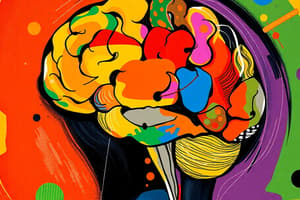Podcast
Questions and Answers
What is the basic rule in videoconferencing when participants have nothing to say?
What is the basic rule in videoconferencing when participants have nothing to say?
mute themselves
What are some measures to improve videoconferencing according to Basch et al.? (Select all that apply)
What are some measures to improve videoconferencing according to Basch et al.? (Select all that apply)
- Switch off self-view (correct)
- Use a camera position showing body, gestures, facial expressions (correct)
- Choose a neutral background (correct)
- Position the chat window close to the camera (correct)
- Use grid-view
Name one of the early pioneers who established psychology's first laboratory.
Name one of the early pioneers who established psychology's first laboratory.
Wilhelm Wundt
Structuralism in psychology aimed to discover the mind's structure through introspection.
Structuralism in psychology aimed to discover the mind's structure through introspection.
Who was the first woman to receive a psychology Ph.D.?
Who was the first woman to receive a psychology Ph.D.?
What was the focus of Behaviorism in psychology?
What was the focus of Behaviorism in psychology?
Which area of psychology studies human happiness and well-being?
Which area of psychology studies human happiness and well-being?
What event typically defines the start of scientific psychology?
What event typically defines the start of scientific psychology?
Why did introspection fail as a method for understanding how the mind works?
Why did introspection fail as a method for understanding how the mind works?
Who would be considered a functionalist and who would be considered structuralists among William James, Wundt, and Titchener?
Who would be considered a functionalist and who would be considered structuralists among William James, Wundt, and Titchener?
From the 1920s through the 1960s, the two major forces in psychology were ___________ and ______________.
From the 1920s through the 1960s, the two major forces in psychology were ___________ and ______________.
Match the following terms with their respective meanings:
Match the following terms with their respective meanings:
How have psychologists participated in the advancement of social issues?
How have psychologists participated in the advancement of social issues?
Flashcards are hidden until you start studying
Study Notes
Introduction to Psychology
Organizational Stuff
- Professor Dr. Johannes Basch's course on psychology
- Request to add a profile picture to Moodle account
Video Conferencing
- Basic rules for video conferencing:
- Mute yourself when not speaking
- Keep camera on
- Raise hand or write in chat to contribute
- Tips for improving video conferencing:
- Choose a neutral background
- Position camera to show body, gestures, and facial expressions
- Avoid side-positioning of the camera and switch off self-view
- Use focus view instead of grid view
Study Questions
- Questions to consider:
- Does psychology belong to natural sciences, social sciences, or humanities?
- Name 3 basic and 3 applied domains in psychology
- Why did the professor encourage students to go through the questionnaire before the first lecture?
Agenda
- Course outline:
- Week 1: Introduction
- Week 2: History of Psychology
- Week 3: Critical Thinking and Research Methods
- ... (up to Week 16)
History of Psychology
- Learning goals:
- Define milestones in psychology's development
- Identify important figures in psychology's history
- Name current developments in psychology
- Early milestones:
- Wilhelm Wundt's laboratory (1879) and psychophysics
- Hermann Ebbinghaus's work on memory (1885)
- Early schools of thought:
- Structuralism (aim to discover the mind's structure)
- Functionalism (aim to discover the evolved functions of thoughts and feelings)
- Women in psychology:
- Mary Whiton Calkins
- Margaret Floy Washburn
- More recent milestones:
- Freudian Psychology
- Behaviorism
- Humanistic Psychology
- Social Psychology
- Cognitive Psychology
- Neuroscience
- Evolutionary Psychology
- Behavioral Genetics
- Cross-Cultural Psychology
- Gender Psychology
- Positive Psychology
- Psychological ideas much earlier:
- Orphics' teachings of the psyche (6th century B.C.)
- Plato's theory of the tripartite soul (5th century B.C.)
- Aristotle's psychological functions (4th century B.C.)
- Galenos' theory of bodily fluids and personality (2nd century)
- Franz Joseph Gall's phrenology (18th century)
Interaction Part
- Exercise on reading scientific articles:
- Understand the structure of the article (introduction, theory, method, results, discussion)
- Identify the research method used in the study
- Analyze the results and discussion
- Exercise on critical thinking:
- Roll a die 24 times and record the results
- Write down the number you wish for each roll
- Record whether the result matches the wished-for number
- Count the number of times the result matches the wished-for number
Studying That Suits You
Use AI to generate personalized quizzes and flashcards to suit your learning preferences.




